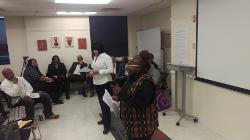"Around the College" is no longer being updated.
View current SUNY Empire Stories.
March 21, 2016
Getting Serious about Prison Education

In recognition of Black History Month, SUNY Empire State College Education for All (ESCEA), one of the college’s many student/alumni clubs, organized an event, “Getting Serious About Prison Education.”
The event focused on informing students, faculty, staff and the public about the importance of educating individuals who are incarcerated in U.S. prisons and the effects of education on recidivism.
The evening’s program featured a panel discussion, a question-and-answer session and performances by a theater group comprised of formerly incarcerated women.
Topics for discussion included school-to-prison pipeline, eliminating requirements for disclosure of convictions on college applications, reinstating TAP and Pell for incarcerated individuals and racism in higher education.
In her welcoming remarks, ESCEA Co-Chair Tanya Thompson ‘14, a graduate student enrolled in the college’s Master of Arts in Adult Learning program, told the audience that U.S. prisons are filled with high-school dropouts and the prison population also has very little, if any, college experience.
Thompson also noted that once released, this population has limited employment opportunities. She said 60 percent return to prison and the pattern is intergenerational, with children with incarcerated parents likely to end up in prison themselves.
“In-prison college programming is a decisive, positive intervention in the cycle linking imprisonment to alienation from educational opportunity,” said Thompson. “Individuals who have access to education while incarcerated report that college has had a transformative impact on their view of the world, as well as their priorities and aspirations for the future. The inverse relationship between educational attainment and recidivism is very steep. Those who go to college while incarcerated are 45 percent less likely to return to prison than those who do not. And this, in turn, translates to dramatic cost savings for New York state. The Correctional Association of New York estimates that every dollar invested in prison education returns two dollars to the taxpayer.”
Panelists included Wesley Caines, re-entry specialist with Brooklyn Defenders, Kenneth Innis, a counselor with the Fortune Society, Edward-Yemil Rosario, and activist and writer Afi Turner, a career development specialist specializing in re-entry with STRIVE New York, Ato Williams, CASAC, MSW, a family specialist with the Fortune Society, and Cory Greene, one of the co-founders of the community organization How Our Lives Link Altogether! (H.O.L.L.A!) and the community relations/training manager for the Center for NuLeadership on Urban Solutions.
“Education is a process that requires one to examine all in existence, known and unknown,” said Greene. “Education is a transformational experience, because it requires that one not only examines the world, complex social relations, her/his story, oppression, privilege, community, family, prisons and more, but, also, education insists that one looks deeply into oneself, to make sense of the reasons one thinks as one thinks and behaves as one behaves. As humans, regardless of one's social status or place in the world, and particularly for those caged in the shackles of state violence, called prisons, education is a must, it is a responsibility all living beings have to other living beings.”
Greene graduated from New York University with a Bachelor of Science in Applied Psychology and currently is in his third year of doctoral studies at the Graduate Center of the City University of New York (CUNY), where he studies Critical Social/Personality Psychology.
Born and raised in Corona, Queens, he graduated from LaGuardia Community College with an Associate of Arts in Deaf Studies (American Sign Language) at the age of 28, after serving seven years in prison.
SUNY Empire State College Provost Alfred N. Ntoko attended and, at the event’s conclusion, was invited to say a few words. He told the audience that the college is thinking seriously about education for the incarcerated.
Because of the college’s 35 locations across the state, Ntoko said, those who begin learning with the college while incarcerated could transition to a location closer to home upon their release.
The provost also stated that SUNY Empire’s mission promotes access to public higher education and that the college was founded to educate nontraditional student populations.
“We know that a lot of community groups are way ahead of us in working with these populations,” said Ntoko. “We would want to work with these community groups as part of this to see how best to serve these particular populations.”
Ntoko told Greene and the other panelists, “If I call, please do not hang up on me, because this is too big not to do something about.”
In addition to the panel discussion and question-and-answer session, Theater for Change, a performance group comprising formerly incarcerated women, performed skits.
In one performance, the troupe depicted behaviors pre- and post-incarceration.
The event was held on Feb. 29, at the college’s Brooklyn location.
